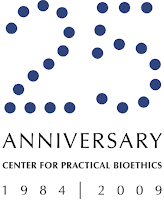The Values of Health Reform
 Rosemary Flanigan
Rosemary FlaniganJune 29, 2009
The new Hastings Center REPORT is focused on health reform, from the perspective of VALUES. (“Connecting American Values with Health Reform”)
Notice the “health,” not “healthcare.”
Erika Blacksher, formerly of the Center and now with Hastings Center, sees “Health” as the value at stake—healthCARE is ”but one determinant of health, and by some measures it is a relatively minor one.”
It’s an interesting way to get people to focus on reform:
Bruce Jennings writes on LIBERTY; Paul Menzel on JUSTICE AND FAIRNESS in mandating universal participation; Jim Sabin on RESPONSIBILITY (in which he contrasts Joey Starrett and Shane the cowboy in the movie); William Sage on SOLIDARITY (it is good to hear talk of “public good” in this economic downturn time); Dan Callahan on MEDICAL PROGRESS (and its unintended consequences—Dan is still beating that drum); Lawrence Gostin on PRIVACY (and how the prevailing model fails to protect it); Ed Pellegrino on PHYSICIAN INTEGRITY (what else?); Frank Davidoff on QUALITY, and Marc Roberts on EFFICIENCY.
I’ll be telling you some of my thoughts. Overall, I like anchoring reform in something besides economics. More later—unless one or other of you has read the issue and want to get a headstart. THANKS.
Labels: health reform; medical ethics











